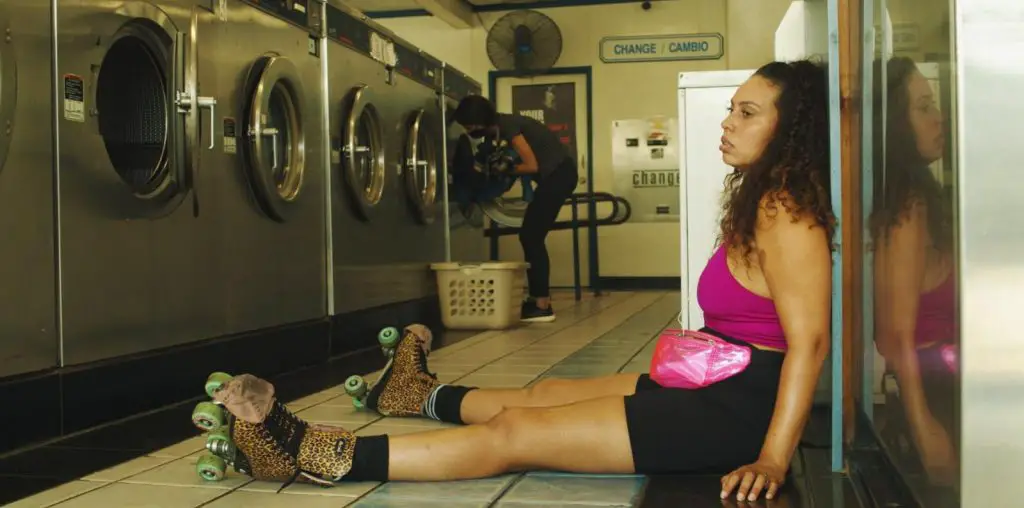
I saw The Trust with Nicolas Cage and Elijah Wood at South by Southwest. It was the world premier, filled to its 1200 seat capacity, with the filmmakers and Elijah Wood in attendance. Every joke was met with laughter and every twist aroused a gasp. For its 93 minute runtime, I was transported to a rip-roaring jewel heist filled with perverse chuckles and nail-biting hijinks.
Afterwards, I told my friends to immediately watch The Trust when it was released. I did not expect my friends, let alone the world, to react with a unanimous and dismissive “meh.” But the last thing I expected, upon rewatching, was to be betrayed by my own perceptions. It’s a perfectly fine movie, but its sheen of elevated storytelling was dulled. Not only did I lose the trust of my friends, but the trust of my own experiences.* But it received a standing ovation? Did the environment manipulate our perception or did we legitimately share a quality experience?

“…the last thing I expected, upon rewatching, was to be betrayed by my own perceptions.”
One of the more alienating experiences for film fans is “early reactions.” To garner advanced promotion, studios hold screening events for select fans, guests, and critics. It’s a relatively new concept and a tad different from a test screening. Test screenings usually have questionnaires and contain unfinished material. Studios and directors use it to gauge audience reactions and see if they need to tweak their material. Advanced screenings are tailored specifically for promotion. Audiences may have to sign an embargo to not reveal details, but they’re not prohibited in saying how they felt.
A current example is Midsommar. I was a big fan of Hereditary and am genuinely looking forward to Ari Aster’s sophomore effort. There are legitimate reasons for my expectations, but hearing ““-holy s— you guys, @MidsommarMovie is a masterpiece.” or Jordan Peele declaring “I think you’ve [Ari Aster] made the most idyllic horror film of all time” taints my expectations. Why? Shouldn’t I be excited? Am I that cynical or have I been burned before?
A movie I feel like I’ve had a weekly conversation about since its release is Batman V. Superman: Dawn of Justice. With Zach Snyder’s startling take on the Man of Steel, I was more curious about Batman V Superman than enthusiastic. Then came the “early reactions.” “Early Reactions are overwhelmingly positive,” “I haven’t felt this giddy after watching a movie since The Avengers. Goosebumps. Everywhere. Need to talk about it ASAP,” and “#BatmanvSuperman made me cry real tears. That is all. #BVSPremiere” graced the internet. Agree with the praise of not, the early reactions are not indicative of its reception. The gloomy and philosophically convoluted superhero venture has a 27% on rotten tomatoes with a 63% audience score (Not that rotten tomatoes is an airtight reference, but the approaching-endless amount of review aggregators average around the same numbers. An aggregating aggregator is needed. It’ll exist if it doesn’t already).
Here’s the difference: Ben Affleck, Amy Adams, Henry Cavil, Zach Snyder, Jesse Eisenberg, Gal Gadot, Diane Lane, Holly Hunter, and Will Smith were in attendance at Radio City Music Hall and the film was screened on a Simplex 70mm projector. I saw the movie two weeks after its release on a screen slightly bigger than my bed. If the movie didn’t exist, I would have been in a swampy theatre with 12 cents worth of popcorn purchased for $8.99. If I were at the premiere, I would be in a historic New York theater, with free refreshments, and encased in celebrities. Their audiences’ enjoyment did not hinge solely on the movie.

“Much like how language is a window into the intent of the speaker, environment sets parameters for how it wants you to feel.”
Cognitive bias is caused by an incalculable amount of social, environmental and personal variables. Festivals and advanced screenings exploit our malleable minds by manipulating our surroundings. You’re less likely to criticize art when the artists are sitting next to you and the production feels more impactful if you’re at an exclusive event. Your senses are telling your brain; “these are all the signals of something great.”
It’s similar to how lawyers use semantics. If their client was injured in an automobile accident, they’re less likely to say “The broken glass from the accident injured my client” and more likely to say “the shattered glass from the illegal collision lacerated my client’s face resulting in excruciating mental and physical anguish.” Much like how language is a window into the intent of the speaker, the environment sets parameters for how it wants you to feel. The lawyer wants you to empathize with his client’s plight and the festival wants you to have a pleasant experience, regardless of the film’s quality.

“That’s a lot of added incentive for a movie. That’s a lot of added incentive to like a movie.”
According to the French Socioligist, Jean Baudrillard, there is a tier system for an object’s value; functionality, economic, symbolic, and sign. The functionality of a movie is the same across the board. In the broadest of senses, movies are made to express and entertain. The remaining three are where things get neat. Economically, festival prices are more than the average movie ticket. Therefore, the movie’s value is inflated. Symbolically, you’re attending a privileged event. You’re getting to see a movie before the general public and it may not even be released in theaters when it’s available. Therefore, it’s a rare opportunity, increasing its value. Not only are you seeing a movie way ahead of time, but you’re seeing it in a foreign location, with illustrious clientele, and at an exclusive event. That signifies your class and preferences, so bam, value boosted. That’s a lot of added incentive for a movie. That’s a lot of added incentive to like a movie.
It is one of the main motivators to premiere potential blockbusters at festivals. In what used to be testing grounds for indie ventures, studios have used the events to prime their upcoming heavy-hitters. In 2019 SXSW premiered Long Shot, Pet Sematary, Stuber, and Us. Us was praised as a “horror masterpiece,” “F*****g Terrifying,” and “…comfortably a top ten lifetime movie going experience.” It was released a few weeks later and earned a 70 million opening weekend with a 255 million global box-office. Early reactions to Pet Sematary were “A hoot and a half!,” “THEY DID IT. A truly disturbing reimagining…,” and …”vicious and I LOVED it!” Then it was released. It took in a 110 million global box office with a 24 million opening weekend, but critics and audiences were not as kind as festival goers. People gravitate to festivals for their content and studios get some early buzz for their upcoming slate. It’s a salivating symbiosis.
I can’t tell you if early reactions correlate to box-office success, but I can tell you it doesn’t hurt. The price-tag to promote a tentpole feature film could cost anywhere from 75-200 million dollars. So, one of the many questions distributors ask before acquiring a movie isn’t just ‘will this movie make money,’ but ‘is this movie worth promoting?” It’s a more beneficial and cost-effective endeavor than a poster on a bus.

“So, one of the many questions distributors ask before acquiring a movie isn’t just ‘will this movie make money,’ but ‘is this movie worth promoting?”
Can there be a backlash to an early reception? I think so. Just as audiences feel alienated by critics, they can be goaded by early reactions. It’s the equivalent of watching someone’s family vacation slideshow, but not knowing the family. I think that’s where my instinctive cynicism comes from. Not only do I feel patronized by hyperbole, but I’m also envious. Did I see Us? Sure did. I liked it, but I wouldn’t call it a masterpiece or a top viewing experience. I would consider The Trust a better experience, but all the boxes for that movie’s value were checked. Would I have preferred seeing Us at the paramount during SXSW? Of course. That would also mean I would be within walking distance of Torchy’s Tacos in Austin.
So, is there a festival bias? Yes. Without question. Is that a bad thing? Eh. That one’s tricky. Distributors and studios using festivals as a tool for their own benefit is fairly dubious, but people seeing something they enjoy is not. That’s why festivals exist. They’re not there for networking luncheons, distributor socials, or marketing workshops. They’re there for you. The audience.
Not having your experience compromised by the enjoyment of others is where the adversity lies. We will never see a movie free of some kind of outside influence. Whether it’s a wave of early reactions, expectations from a provocative trailer, or what you ate before you sit down, you will always bring something with you into the theater. Acknowledging that clears up some of the window panes to your psyche. But more importantly, knowing that irons out some of your apprehensions.

“Whether it’s a wave of early reactions, expectations from a provocative trailer, or what you ate before you sit down, you will always bring something with you into the theater.”
Film Festivals are wonderful. They’re a group of like minded people gathering to celebrate their passion for cinema. Whether it’s a grand premiere in a lavish theater, attended by celebrities, or a 30 year old horror movie projected onto a barn, they are a shared experience. And a shared experience can be a precious thing.
Also, I enjoyed Midsommar.
Thanks for reading.
Please Check Out: Cinepoclypse, DedFest, Tromadance, Beyond Fest, Crystal Palace Film Festival, Sitges, Found Footage Festival, What The Film Festival, H.P Lovecraft Film Festival, Mile High Horror, Toronto After Dark, Telluride Horror Show, Bloody Mary Film Festival...sheesh, there’s a lot.
Bibliography
“The Stuff of Thought” by Steven Pinker
“The System of Objects” by Jean Baudrillard
“The Brain that Changes itself” by Norman Doidge.
“Now You See It” by Daniel Yon https://aeon.co/essays/how-our-brain-sculpts-experience-in-line-with-our-expectations
*Punned!
– Jason Krawczyk


Might be the First film blog article I’ve read to reference Baudrillard.